Difficulties of living in a changing world
 How does a person think about things they aren’t already thinking about?
How does a person think about things they aren’t already thinking about?
 When we are embedded in doing something we are likely blind to the profoundly changing world around us.
When we are embedded in doing something we are likely blind to the profoundly changing world around us.
 How do we keep our brain focused on the real road ahead and what’s next without it naturally slipping back into the normal daily flow of events that eventually lead to dead ends? Beware assumptions
How do we keep our brain focused on the real road ahead and what’s next without it naturally slipping back into the normal daily flow of events that eventually lead to dead ends? Beware assumptions
 There’s no way to know what someone is going to be doing in ten or fifteen years.
There’s no way to know what someone is going to be doing in ten or fifteen years.
 Just about everybody enters the world of work through known day-to-day operating work.
Just about everybody enters the world of work through known day-to-day operating work.
 How could we ever acquire a strategic and dynamic worldview from our beginning vantage points?
How could we ever acquire a strategic and dynamic worldview from our beginning vantage points?
 When the time comes to begin creating tomorrowS, what mental radar content will be available?
When the time comes to begin creating tomorrowS, what mental radar content will be available?
 There is a need to work on this when there is no apparent need.
There is a need to work on this when there is no apparent need.
 Otherwise, it sabotages one-self and one’s fellow employees, organization, community …
Otherwise, it sabotages one-self and one’s fellow employees, organization, community …

Thoughts about the future
The future depends on what’s between each individual’s ears.
Foundations For Future Directed Decisions
Extrapolating yesterdayS is a fruitless attempt to predict the future.
“Trying to predict the future
is like driving down a country road at night
with no headlights on and
looking out the back window”
“We know only two things about the future.
It cannot be known.
It will be different from what exists now
and from what we now expect”
Peter Drucker
The actual results of action are not predictable.
Indeed, if there is one rule for action,
and especially for institutional action,
it is that the expected results will not be attained.
The unexpected is practically certain.
But are the unexpected results deleterious? Read more
The future that has already happened

Snippets from the about Management page
In less than 150 years, management has transformed the social and economic fabric of the world’s developed countries.
It has created a global economy and set new rules for countries that would participate in that economy as equals.
And it has itself been transformed
The center of modern society is the managed institution.
The managed institution is society’s way of getting things done these days.
And management is the specific tool, the specific function, the specific instrument, to make institutions capable of producing results.
The institution, in short, does not simply exist within and react to society.
It exists to produce results on and in society.
The institution is itself an organ of society and exists only to contribute a needed result to society, the economy, and the individual.
Organs, however, are never defined by what they do, let alone by how they do it.
They are defined by their contribution.
… It should have been obvious from the beginning that management and entrepreneurship are only two different dimensions of the same task.
… It also follows that managing a business must be a creative rather than an adaptive task.
The more a management creates economic conditions or changes them rather than passively adapts to them, the more it manages the business
… for constantly pushing back the limitations of economic circumstances on the enterprise’s ability to contribute.
And only to the extent to which it masters the economic circumstances, and alters them by consciously directed action, does it really manage.
“The customer never buys what you think you sell. And you don’t know it. That’s why it’s so difficult to differentiate yourself.” — Drucker
Indeed, the first task of management is to define what results and performance are in a given organization — and this, as anyone who has worked on this task can testify, is in itself one of the most difficult, one of the most controversial, but also one of the most important tasks
It is, therefore, the specific function of management to organize the resources of the organization for results outside the organization
To manage a business means, therefore, to manage by objectives
The right definition of a manager is one who “is responsible for the application and performance of knowledge.”
The function of organizations is to make knowledges productive.
Organizations have become central to society in all developed countries because of the shift from knowledge to knowledges.
The more specialized knowledges are, the more effective they will be.
Knowledges by themselves are sterile.
They become productive only if welded together into a single, unified knowledge.
To make this possible is the task of organization, the reason for its existence, its function.
The productivity of knowledge is going to be the determining factor in the competitive position of a company, an industry, an entire country.
… Rather, they maximize the wealth-producing capacity of the enterprise.
“AS WE ADVANCE deeper into the knowledge economy, the basic assumptions underlying much of what is taught and practiced in the name of management are hopelessly out of date. They no longer fit reality.” — Management’s New Paradigms
“Despite all the outpouring of management writing these last twenty-five years, the world of management is still little-explored.”

The more roads your brain has been down
the better equipped you’ll be for the road ahead
Attention directing
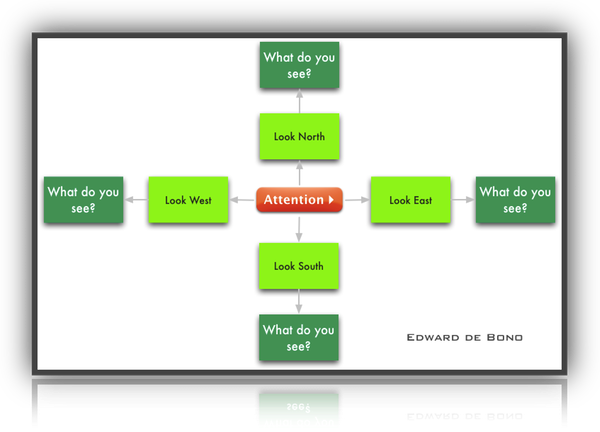
“To know something,
to really understand something important,
one must look at it from sixteen different angles.
People are perceptually slow,
and there is no shortcut to understanding;
it takes a great deal of time.” read more

Information gathering and decision thinking
For this to be really useful, you’ll have to harvest interesting ideas and figure out how to implement them across time and within time. There is more on this process further down the page — here
We can only work on, with and toward the “things”
on our active “mental radar.”
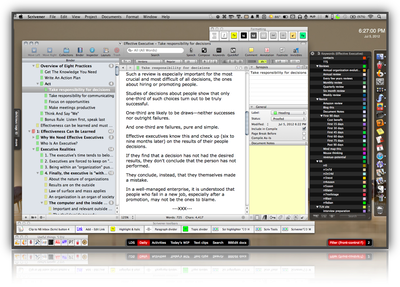
Henry Jones Grail Diary
his thinking canvases and notes

Larger view of the image below.
Concepts to daily action
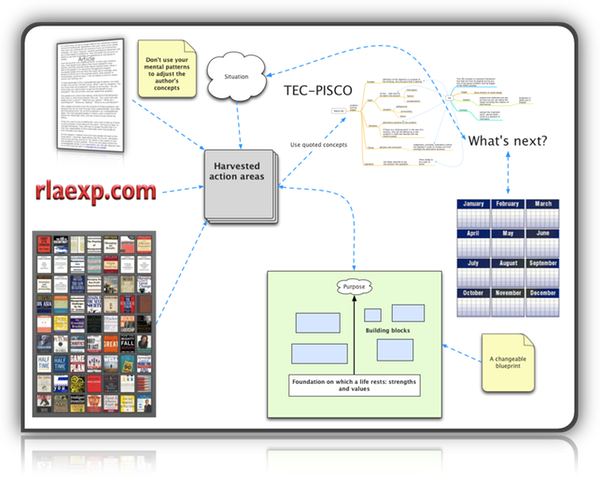
“I’ve seen a great many people
who are exceedingly good at execution,
but exceedingly poor at picking the important things.
They are magnificent at getting
the unimportant things done.
They have an impressive record
of achievement on trivial matters” — PFD

Somebody, somewhere is doing something
that is obliterating the past and creating new realities

October 16th, 2003 — “Hell Froze Over.” Apple launched – iTunes for Windows.
That opened up the iPod to the 97% of people who had PCs.
Their first iPods turned into their first iPhones
… switched to a Macintosh all together
… along the way Apple’s market cap climbed to
the most valuable company in the world …
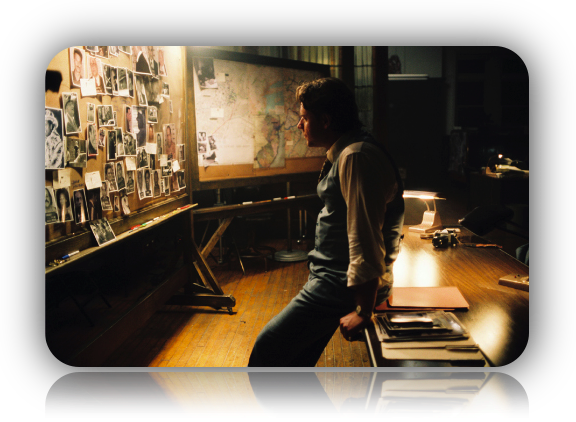
This exploration will help you avoid traps and open new alternatives.
Try to think of this in a unfolding world.
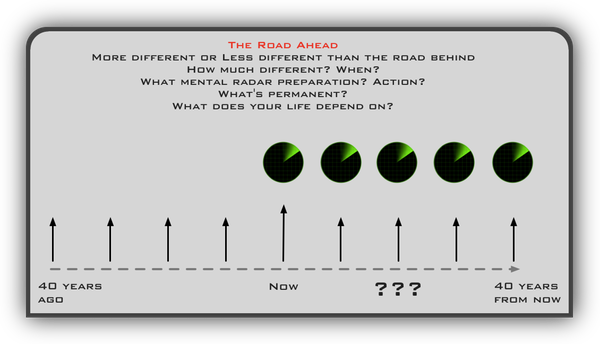
“AS WE ADVANCE deeper into the knowledge economy” — PFD
It’s no secret that people frequently outlive their employers. Even when they don’t many get bored doing the same things …
Corporations once built to last like pyramids are now more like tents.
Tomorrow they’re gone or in turmoil.
And this is true not only of companies in the headlines like …
Technology is changing very quickly, as are markets and structures.
You can’t design your life around a temporary organization. — Peter Drucker
Putting this off until tomorrow almost guarantees unhappy tomorrowS.

Where to jump next?

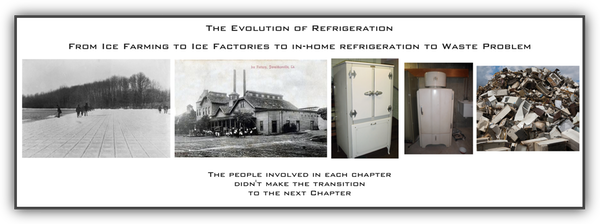
Mission ::: Continuity and Change

Film to Point-and-shoot to Smartphones
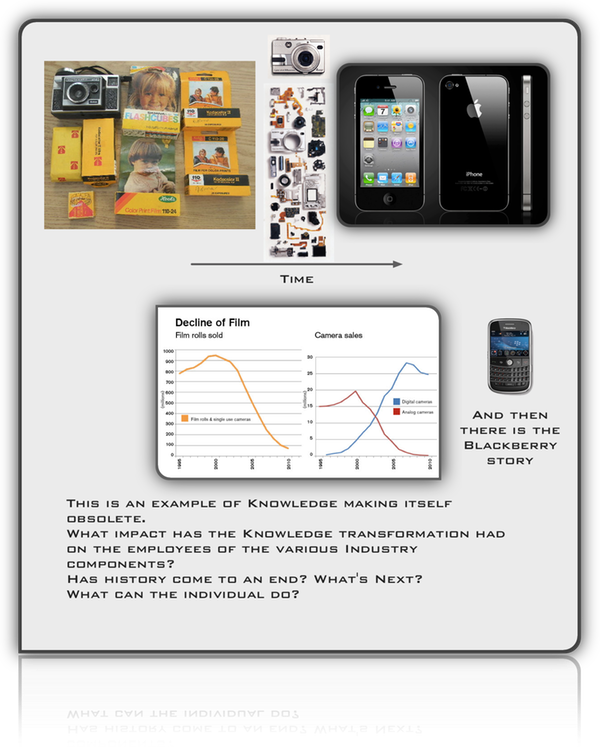
“Twelve cell phones that changed the world”


The patterns evident in the images above
exist in almost every area of the economy and society
Looking around a world moving in time
— it alters conclusions
Try separate page searches for “knowledge” and “information”

Organization evolution
Competition on the road ahead
Try a page search for “global”
… In short, it (the modern organization) must be organized for constant change.
The organization’s function is to put knowledge to work—on tools, products, and processes; on the design of work; on knowledge itself.
It is the nature of knowledge that it changes fast and that today’s certainties always become tomorrow’s absurdities
… snip, snip …
“For managers, the dynamics of knowledge impose one clear imperative: every organization has to build the management of change into its very structure.
On the one hand, this means every organization has to prepare for the abandonment of everything it does.
… snip, snip …
Indeed, organizations increasingly will have to plan abandonment rather than try to prolong the life of a successful product, policy, or practice—something that so far only a few large Japanese companies have faced up to
… snip, snip …
The need to organize for change also requires a high degree of decentralization.
That is because the organization must be structured to make decisions quickly.
And those decisions must be based on closeness—to performance, to the market, to technology, and to all the many changes in society, the environment, demographics, and knowledge that provide opportunities for innovation if they are seen and utilized.” — The New Society of Organizations and Managing in a Time of Great Change
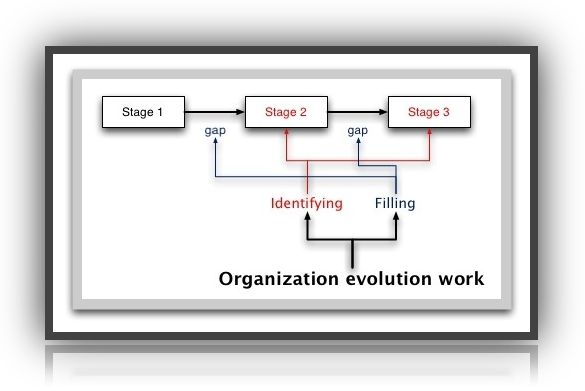
They're Not Employees, They're People
Alliances, Collaborations, Outsourcing
substantial revenues and results but few employees
Organizations in the post-capitalist society thus constantly upset, disorganize, and destabilize the community.
Forbes: America's Most Miserable Cities 2013
Economic stagnation and severe social tension from
failure to raise knowledge and service worker productivity
…This means a radical change in structure for the organizations of tomorrow.
It means that the big business, the government agency, the large hospital, the large university will not necessarily be the one that employs a great many people.
It will be the one that has substantial revenues and substantial results—achieved in large part because it itself does only work that is focused on its mission; work that is directly related to its results; work that it recognizes, values, and rewards appropriately.
The rest it contracts out. — Post-Capitalist Society
The Information-Based Organization — fewer rungs on the organization ladder
From The Frontiers of Management
The “office of the future” is still largely speculation.
But the organization of the future is rapidly becoming reality—a structure in which information serves as the axis and as the central structural support.
A number of businesses—Citibank, for instance, in the United States; Massey-Ferguson, the Canadian multinational tractor maker; and some of the large Japanese trading companies—are busily reshaping their managerial structure around the flow of information.
And wherever we have been moving into genuine automation of manufacturing production, as in the Erie, Pennsylvania, locomotive plant of General Electric, we are finding that we have to restructure management and redesign it as an information-based organization.
The organization chart of an information-based system may look perfectly conventional.
Yet such an organization behaves quite differently and requires different behavior from its members.
The information-based structure is flat, with far fewer levels of management than conventional ones require.
When a large multinational manufacturer restructured itself around information and its flow, it found that seven of its twelve levels of management could be cut out.
Similarly, in automated plants, for example, the Nissan auto assembly plant outside of Yokohama, Japan, and the GE locomotive plant in Erie, most of the traditional management layers between first-line supervisor and plant manager have disappeared.
These levels, it turns out, were not levels of authority, of decision making, or even of supervision.
They were relays for information, similar in function to the boosters on a telephone cable, which collect, amplify, repackage, and send on information—all tasks that an impersonal “information system” can do better.
This pertains in particular to management levels that “coordinate” rather than “do”—group executives, or assistants to, or regional sales managers.
But such levels of management as remain in information-based organizations find themselves with far bigger, far more demanding, and far more responsible jobs.
This is true particularly in respect to the first-level supervisor in the automated plant.
The information-based structure makes irrelevant the famous principle of the span of control, according to which the number of subordinates who can report to one superior is strictly limited, with five or six being the upper limit.
Its place being taken by a new principle—I call it the span of communications: The number of people reporting to one boss is limited only by the subordinates’ willingness to take responsibility for their own communications and relationships, upward, sideways, and downward.
“Control,” it turns out, is the ability obtain information.
And an information system provides that in depth, and with greater speed and accuracy than reporting to the boss can possibly do.
The information-based organization does not actually require advanced “information technology.”
All it requires is willingness to ask, Who requires what information, when and where? (read more)

The society of organizations demands of the individual decisions regarding himself.
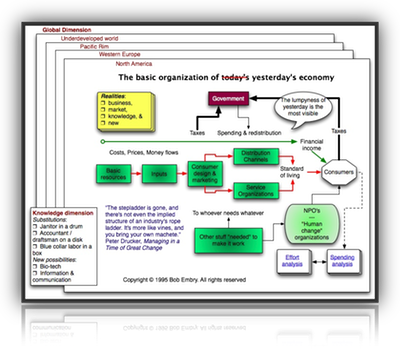
Economic content and structure exploration
At first sight, the decision may appear only to concern career and livelihood.
“What shall I do?” is the form in which the question is usually asked.
But actually it reflects a demand that the individual take responsibility for society and its institutions.
“What cause do I want to serve?” is implied.
 The world is full of options
The world is full of options
 Carefully choosing your nonprofit affiliations (beware of scams and inside-out bureaucracies because society suffers the consequences and you are part of society.
Carefully choosing your nonprofit affiliations (beware of scams and inside-out bureaucracies because society suffers the consequences and you are part of society.
If they don’t produce the desired results outside of themselves then we have to pay a second or a third or a fourth … organization until we get what is needed.)
And underlying this question is the demand the individual take responsibility for himself.
 Managing Oneself then …
Managing Oneself then …
 The Effective Executive: Preface
The Effective Executive: Preface
“What shall I do with myself?” rather than “’What shall I do?” is really being asked of the young by the multitude of choices around them.
The society of organizations forces the individual to ask of himself:
 “Who am I?”
“Who am I?”
 “What do I want to be?”
“What do I want to be?”
 “What do I want to put into life and what do I want to get out of it?”
“What do I want to put into life and what do I want to get out of it?”
read more on how can the individual survive …
The Age of Discontinuity:
Guidelines To Our Changing Society
enhanced by bobembry

… “Power has to be used.
It is a reality.
If the decent and idealistic toss power in the gutter, the guttersnipes pick it up.
If the able and educated refuse to exercise power responsibly, irresponsible and incompetent people take over the seats of the mighty and the levers of power.
Power not being used for social purposes passes to people who use it for their own ends.
At best it is taken over by the careerists who are led by their own timidity into becoming arbitrary, autocratic, and bureaucratic.”
— How Can The Individual Survive?
The Age of Discontinuity: Guidelines To Our Changing Society
by Peter Drucker
The three types of intelligence mentioned in The Prince by Niccolò Machiavelli and types of behavior that can be observed … here

Larger view of career roads image below
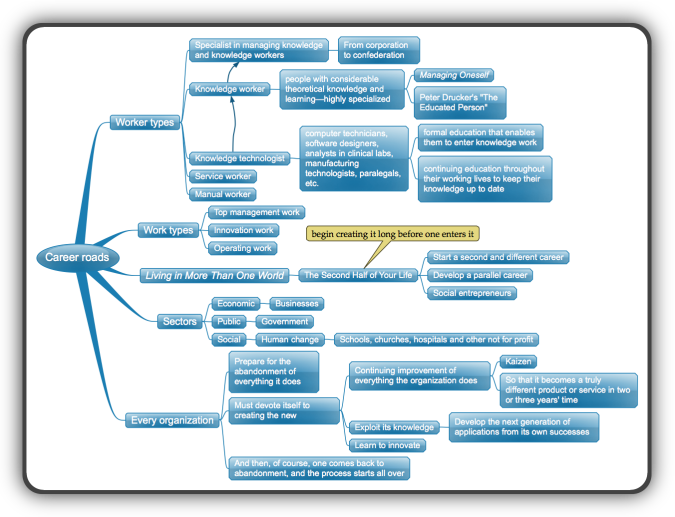
Larger view of career time view below
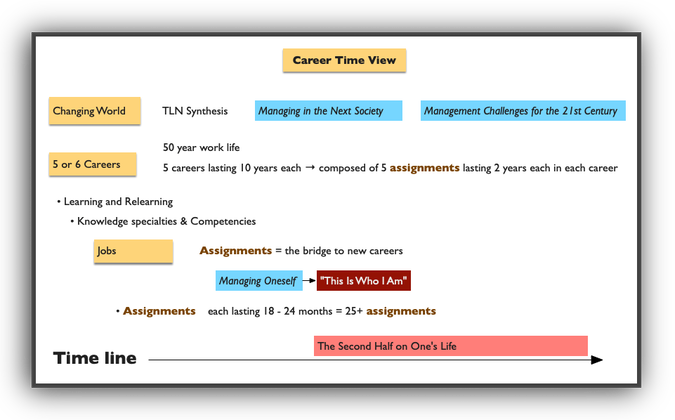
When you begin to fall into a pleasant routine, it is time to force yourself
to do something different. “Burnout,” much of the time, is a cop-out for being bored.
Nothing creates more fatigue than having to force yourself to go to work
in the morning when you don’t give a damn.
Perhaps, all that is needed is a small shift
— “Repotting” Yourself, Managing the Non-Profit Organization
“The leading management thinker
describes seven personal experiences
that taught him how to grow, to change, and to age —
without becoming a prisoner of the past”. More
Transnationalism, Regionalism, and Tribalism

... replace the quest for success with the quest for contribution.
(to the society of organizations moving in time — above)
The critical question is not, “How can I achieve?”
but “What can I contribute?”
The Daily Drucker

Successful careers are not planned
They develop when people are prepared
for opportunities
because they know
their strengths,
their method of work, and
their values.
Knowing where one belongs
can transform an ordinary person
—hardworking and competent but otherwise mediocre—
into an outstanding performer.
“What do you need to learn to get the most
out of your strengths?” — The world is full of options
“What do you need to learn so that you can decide
where to go next?” — Managing in a Time of Great Change

“Most of us, if we live long enough, must change careers.
If career planning means not being open to opportunity, it doesn’t work.
Planning should tell you only which opportunities are the right ones for you and which are the wrong ones” — Drucker

“Remarkably few Americans are prepared to select jobs for themselves.
When you ask,
“Do you know what you are good at?
Do you know your limitations?”
they look you in the eye with a blank stare.
Or they often respond in terms of subject knowledge, which is the wrong answer.
When they prepare their résumés, they try to list positions like steps up a ladder.
It is time to give up thinking of jobs or career paths as we once did and think in terms of taking on one assignment after another.
We have to leap right over the search for objective criteria and get into the subjective—what I call competencies” — Managing in a Time of Great Change

… “One implication of this is that individuals will increasingly have to take responsibility for their own continuous learning and relearning, for their own self-development and for their own careers.
Try a page search for “learning to learn” on the learning page
They can no longer assume that what they have learned as children and youngsters will be the “foundation” for the rest of their lives.
It will be the “launching pad”—the place to take off from rather than the place to build on and to rest on.
They can no longer assume that they “enter upon a career” which then proceeds along a pre-determined, well-mapped and well-lighted “career path” to a known destination—what the American military calls “progressing in grade.”
The assumption from now on has to be that individuals on their own will have to find, determine, and develop a number of “careers” during their working lives.
And the more highly schooled the individuals, the more entrepreneurial their careers and the more demanding their learning challenges.
The carpenter can still assume, perhaps, that the skills he acquired as apprentice and journeyman will serve him forty years later.
Physicians, engineers, metallurgists, chemists, accountants, lawyers, teachers, managers had better assume that the skills, knowledges, and tools they will have to master and apply fifteen years hence are going to be different and new.
Indeed they better assume that fifteen years hence they will be doing new and quite different things, will have new and different goals and, indeed, in many cases, different “careers.”
And only they themselves can take responsibility for the necessary learning and relearning, and for directing themselves.
Tradition, convention, and “corporate policy” will be a hindrance rather than a help.” — Innovation and Entrepreneurship

Needs of continuing education
Another change that is predictable, though entirely different, is that a new focus for school and learning is emerging: the continuing education of already-educated adults.
Intelligent Machines and Displaced Workers
Putting More Now Into The Internet
Precisely because knowledge is becoming the central resource of a modern economy, continuous learning is essential.
For knowledge, by its very definition, makes itself obsolete every few years, and then knowledge workers have to go back to school.
… “For the major new insights in every one of the specialized knowledges arise out of another, separate specialty, out of another one of the knowledges.
Both economics and meteorology are being transformed at present by the new mathematics of chaos theory. Geology is being profoundly changed by the physics of matter; archaeology, by the genetics of DNA typing; history, by psychological, statistical, and technological analyses and techniques.” Chapter 48, Management, Revised Edition
They may be store managers and retail buyers, like the ones who attend your marketing university, or physicians, or engineers, but every few years they have to refresh and renew their knowledge.
Otherwise they risk becoming obsolescent.
This will have tremendous impact on the university and on schools.
It will force us to accept the fact that, in the knowledge society, learning is life-long and does not end with graduation.
In fact, that is when it begins.
It will also have tremendous impact on employing institutions
In effect, these are still changes within the system, rather than changes of the system.
From Drucker on Asia —
A Dialogue Between Peter Drucker and Isao Nakauchi

Somewhere down the road: One’s Own Responsibility
“ … The most important thing that underlies all these practices is that individuals — and especially knowledge people — who manage to keep themselves effective and who manage to keep on growing and changing take responsibility for their development and their placement.
This may be the most novel conclusion.
And it may be the one that is most difficult to apply.
Today’s organization, whether it is a business or a government agency, is still based on the assumption that the organization is responsible for placing the individual and for providing the experiences and challenges that the individual needs.
The best example of this I know is the personnel department in the typical, large Japanese company—or the prototype on which it has been modeled or the human resources department in a traditional army.
I know no more responsible group of people than those in the typical Japanese human-resources department.
Yet they will, I think, have to learn to change.
Instead of being decision makers, they will have to become teachers, guides, counselors, advisers.
The responsibility for the development of the individual knowledge worker, and for his or her placement, will, I am convinced, have to be taken by the individual.
Connecting
It will have to become very much the responsibility of the individual to ask,
What kind of assignment do I now need?
What kind of assignment am I now qualified for?
What kind of experience and what kind of knowledge and skill do I now need to acquire?
The decision, of course, cannot be that of the individual alone.
It has to be made in contemplation of the needs of the organization.
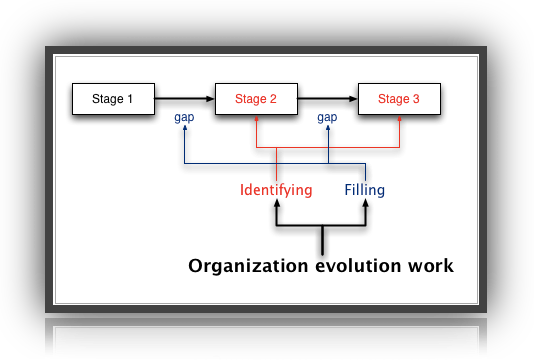
It also has to be made on the basis of an outside appraisal of the strengths, the competencies, the performance of the individual.”
Chapter 47, Management, Revised Edition

Harvesting ideas and concepts
Larger view of image below
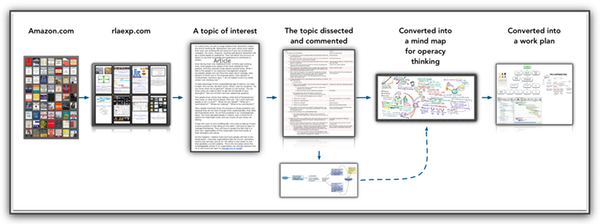
Larger view of challenge thinking (below) and an alternative — operacy
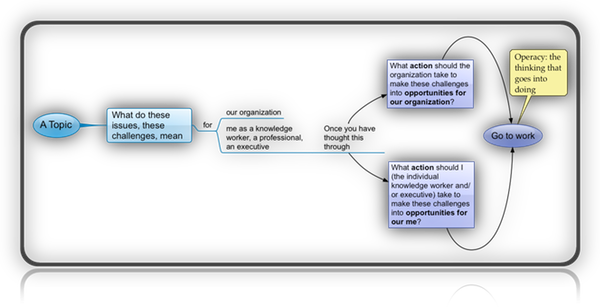
Dense reading and Dense listening and Thinking broad and Thinking detailed
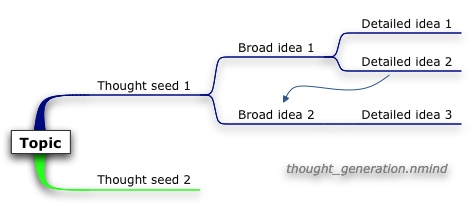
Questions ::: Thinking canvases
Radar system ::: Calendarization ::: Conceptual resource digestion ::: Concepts to daily action
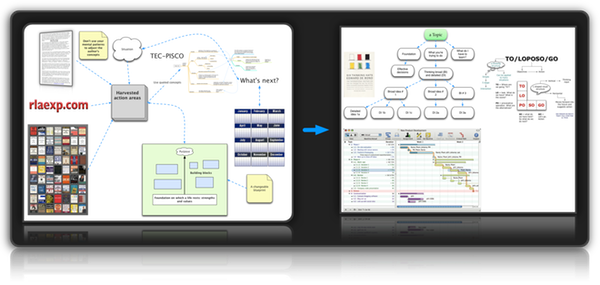
Larger
PISCO-TEC ::: Six Thinking Hats ::: TO/LOPOSO/GO (image ::: book)
Thinking (the knowledge worker’s doing)
About thinking and 12 principles
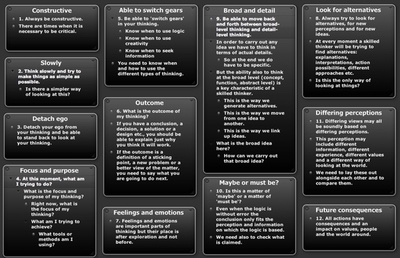
Larger
What Everybody Knows Is Frequently Wrong ::: If You Keep Doing What Worked in the Past You’re Going to Fail ::: Approach Problems with Your Ignorance—Not Your Experience ::: Develop Expertise Outside Your Field to Be an Effective Manager ::: Outstanding Performance Is Inconsistent with Fear of Failure ::: You Must Know Your People to Lead Them ::: People Have No Limits, Even After Failure ::: Base Your Strategy on the Situation, Not on a Formula — A Class With Drucker: The Lost Lessons of the World's Greatest Management Teacher


